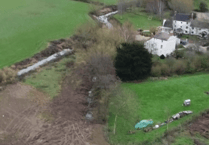FOREST of Dean District Council has issued an urgent warning to residents after a number of people reported receiving scam emails claiming to be official Council Tax payment reminders.
The emails, which are designed to look authentic, tell recipients that their Council Tax payment has not been received for the current billing period.
The message then prompts them to click a link to "confirm" their payment method, something the council says it would never ask residents to do via email.
Council officials are warning that these messages are part of a wider scam targeting households across the area, and they are urging people not to click on any links or provide any personal or financial details.
A spokesperson for Forest of Dean District Council said: "These emails are extremely deceptive and appear official at first glance. They are designed to create panic by suggesting you’re behind on your Council Tax. The goal is to trick you into handing over sensitive information such as bank details. We want to reassure residents that we will never contact you in this way about your Council Tax."
The scam warning comes as cyber criminals become increasingly sophisticated in how they target people, particularly by using realistic branding, formal language and urgent messages to trick recipients into making hasty decisions.
The council has shared several key signs that can help people identify a scam email.
One of the first things to check is the sender’s email address. Legitimate council communications will come from an official government domain, not from a public email provider such as Gmail, Yahoo or Outlook.
Another warning sign is the list of recipients. Scam emails are often sent to large groups of people at once, with multiple addresses visible in the 'To' or 'Cc' fields.
Residents are also advised to hover their cursor over any buttons or links in the email before clicking. This allows you to see the full web address the link is trying to take you to. If it does not match the official Forest of Dean District Council website, or if it looks suspicious in any way, do not click on it.
Spelling and grammar errors can also be a giveaway. Scam emails often include mistakes or use a tone that does not reflect the council’s usual professional communication style.
The council has advised residents who receive a suspicious email or are unsure about the authenticity of a message to get in touch directly using official contact details found on council documentation or by phoning the customer services team.
“If you’re ever in doubt about an email or message relating to Council Tax, do not respond or click any links,” the council spokesperson added. “Instead, contact us directly and we will be happy to confirm whether the message is genuine.”
As a general rule, the council is reminding residents never to share personal or financial information via email unless they are absolutely certain it is safe to do so.





Comments
This article has no comments yet. Be the first to leave a comment.